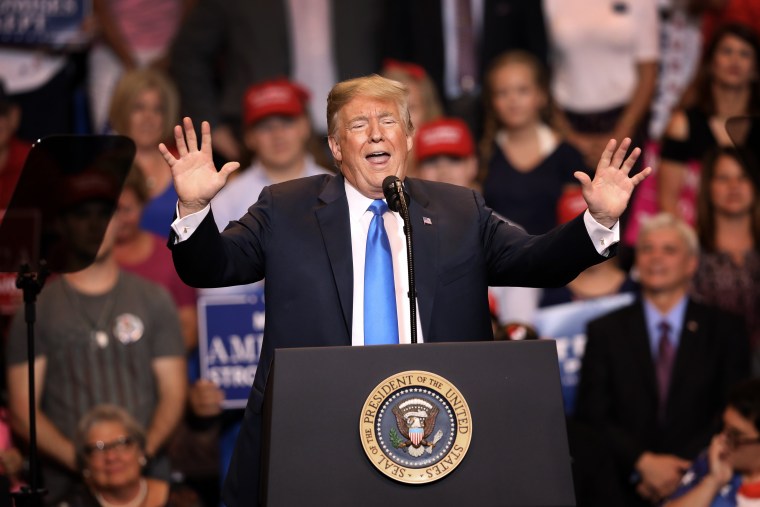Despite his unpopularity, Donald Trump loves to talk about his approval rating. Take yesterday afternoon, for example.
"Over 90% approval rating for your all time favorite (I hope) President within the Republican Party and 52% overall. This despite all of the made up stories by the Fake News Media trying endlessly to make me look as bad and evil as possible. Look at the real villains please!"
There's a fair amount of nonsense in the president's tweet, but it's the approval rating that stood out for me. Trump has a 52% approval rating? Since when?
As it turns out, never. FiveThirtyEight has a frequently updated chart documenting the president's average approval rating since the start of Trump's term, and he's never reached the 50% mark, at least not yet.
Maybe he was referring to a specific poll that he cherry picked? That appears to be wrong, too: there are literally zero publicly available national surveys that show the president's approval rating that high.
So what is Trump talking about? In practice, it looks like the president, dissatisfied with Americans' opinions, made up an approval rating for himself that made him happy. But aside from the oddity of such a decision, I'm especially interested in how he did this.
In April, Trump called into a radio talk show and argued that when it comes to understanding his public support, the responsible thing to do is take his approval rating and then "add another 7 or 8 points to it." The president said this accounts for those people who like him, but are too embarrassed to admit to pollsters.
Two months ago, at a rally in North Dakota, Trump pointed to a non-existent group of people to bolster his practice: "They said, some great people, they said, 'Any time Trump gets a poll, add 12 to it.'"
This is not smart. Plenty of modern presidents have struggled at times with low approval ratings, and they've usually responded by de-emphasizing the importance of polls. Trump, however, is breaking new ground, insisting that the polls are right -- just so long as we arbitrarily add between 7 and 12 points to his approval rating, just because he says so.
Ahead of the 2012 elections, the right embraced poll denialism to an unnerving degree -- I still remember Rachel's segment on the "Unskewed Polls" guy -- and it appears the president has picked up on where conservatives left off six years ago.
As for why any of this matters, there are a couple of angles to keep in mind. The first is that it's likely to have a significant impact on the 2018 elections: the president's party historically struggles badly in midterm cycles, but the exceptions have come when the person in the White House enjoys broad public support. (See Clinton in 1998 and Bush in 2002, for example.) Trump's unpopularity leaves GOP officials and candidates in a worse position.
Second, as regular readers know, if the president looks at all polling data through an ego-boosting lens, he'll never know when it might be wise to change course.
After more than a year of effort, if you were a historically unpopular president -- despite a healthy economy and generally favorable conditions -- you might consider some kind of course correction. That, however, would require a combination of effort and the reevaluation of key assumptions.This president has no interest in either.
Indeed, it would also necessitate an ability to see data as it actually exists, and we can add this to the list of things Trump isn't prepared to do.
